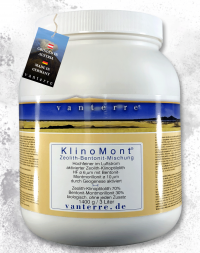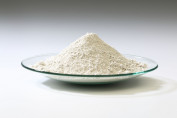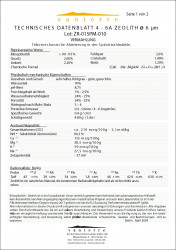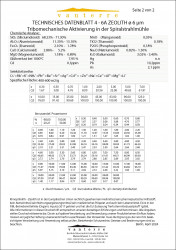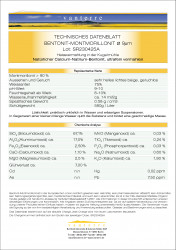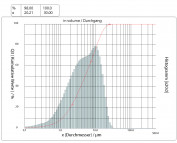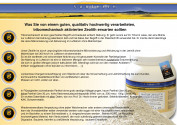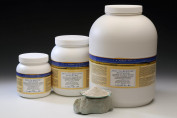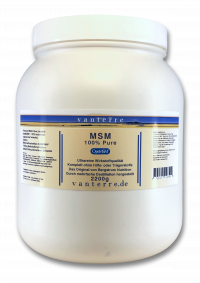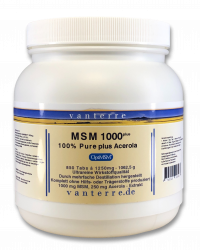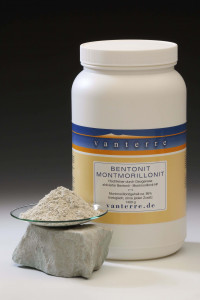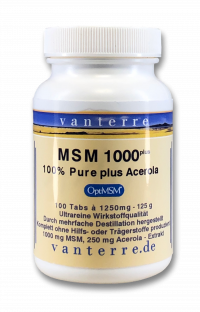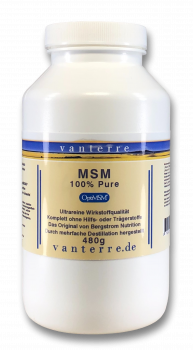KlinoMont® - NATURAL ZEOLITE AND BENTONITE MIXTURE 70:30 6μm 1400g
Product.Nr.: ZB-61400-1
Manufacturer: v a n t e r r e
EUR 42,50
incl. 19 % VAT
product description
KlinoMont® - ZEOLITH - BENTONITE - THE MIXTURE - 1400g - 3 LITERS
Why Zeolite and Bentonite mixed? Because they complement each other excellently! More than the sum of their parts!
Nature Zeolite Bentonite Mixture - 1400g in the BPA-free 3-liter container
70% Zeolite Clinoptilolite ø 6 µm, micronized in airflow with 30% Bentonite Montmorillonite, ø 10 µm hot ground and dried in the ball mill
If anything belongs together, it's these two minerals! The somewhat "rougher" Zeolite as crystalline and the soft, gentle Bentonite as a layered clay mineral, which is capable of forming a protective film on the mucous membranes and binding mycotoxins even better than Zeolite. As a mixture, they are an excellent third option in this area. Professionally mixed in a ratio of 70:30, there is no need to swell the Bentonite, as the particles are so finely mixed together that hardly any lumps can form.
However, the occurrence of geogenesis-activated Bentonite from the Aegean is unfortunately depleted, and our special supplier for this mineral has informed us that there is no Bentonite of this quality available anywhere in Europe. Our supplier certifies the Bentonite as a pharmaceutical excipient and also does not want to use Bentonite that is activated by chemical processes. Therefore, we have now obtained Bentonite from Fort Benton, Wyoming, the original location of this mineral, from which it also derives its name. However, mixing with this Bentonite is a little more difficult than before. It is not as easily soluble in water as the other, all mixing attempts in the facility result in a completely homogeneous mixture, but it acts a bit slower in solution. You have to stir a little longer, but this also increases the electricity and thus the effect. This Bentonite can absorb up to 10 times its weight in water and swell up to 16 times its volume.
Zeolite / KlinoMont® and Horses
Horses don't have it easy with what grows in the pastures nowadays and what they are fed as hay. The grass toxins, which are supposed to increase yield and grass resistance, are good for the grass, but very bad for horses. Their sensitivity in the digestive tract, even a little too many carbohydrates, and the balance in the cecum is immediately disrupted, the environment becomes too acidic, the bacteria that digest carbohydrates multiply almost explosively.
There are also the fiber-digesting bacteria, which, to access the nutrients in them, break down the fibers, but also the carbohydrate-digesting bacteria. Ideally, the two should always balance each other out, because this balances the pH in the environment. However, if too many carbohydrates enter the cecum, these bacteria multiply extremely, a sour environment is created due to the lactic acid they excrete. This is hostile to the fiber-digesting bacteria, which contain the endotoxins that are released when these bacteria die. This acidic environment damages the intestinal walls, and the endotoxins and lactic acid can migrate through the intestinal walls into the extracellular matrix and eventually end up in the blood, where they can be responsible for acidifying the entire organism bit by bit. In horses, this often leads to hoof problems. First signs such as foul-smelling feces, diarrhea, watery feces, bloating, infections, or allergies may indicate such an overload of the intestinal flora. The detoxification metabolism is completely overwhelmed, and the immune system is weakened.
This is where aluminosilicates come in handy, Zeolite and Bentonite as a mixture, both basic ion exchangers with a pH value between 8.5 -10. They bind pollutants and release colloidal minerals to the weakened body in ion exchange. They also both bind mycotoxins, which is so important for grass toxins.
KlinoMont® is very gentle for horses because, due to the airflow micronization, it is not only very fine but also contains almost no Zeolite particles over 20 µm, the 30% Bentonite with the largest particles of about 38 µm are sufficient in the mixing ratio to completely line the digestive tract with a gel protective film without sedimenting in the cecum. According to the motto "more is better", horses were previously given quite coarse Zeolite in quantities of 100g/day, as with cows (which don't mind as much), which resulted in the poor horses having colic from sedimented coarse Zeolites in the cecum. It is also not necessary to give a healthy large horse more than 10-20 g/day of KlinoMont®, and in acute cases, not necessarily more than 30g per day. We have heard from many customers that these amounts are completely sufficient. KlinoMont® has a lot of power in this regard. Therefore, it should also be noted that chemical medications can be completely neutralized without a time interval, especially very hard, metal-containing medications.
Tip: The easiest way is to mix KlinoMont® 1 X 1 with water and then mix the paste under the feed, with dry feed mixtures simply mix the powder underneath. It is also good to mix it into the drinking water of the horses while stirring.
FREE SHIPPING IN GERMANY
Delivery time Germany 2 - 4 days
Delivery time abroad 4 - 8 days
Zeolite - Clinoptilolite
Our 6µm natural zeolite-clinoptilolite comes, like many high-quality zeolites, from the Carpathian belt. It is mined there according to the specifications of our Austrian suppliers and ground in Austria in a roller bowl mill / hammer mill to about 125 µm (micron). It is then micronized in the Jetmill process (the spiral jet mill is a gentler development of the tribomechanical micronization TmaZ) by the manufacturer of the mills and a specialized service provider in an airflow at about 300 km/h through particle/particle collision to ø 6µm (micron) and activated. It does not contain any nanoparticles. The datasheet and the chart for particle size distribution are available for viewing.
Particle sizes in numbers:
- 0.30 µm = 0.50% - 0.50 µm = 1.07% - 0.70 µm = 0.99% - 1.00 µm = 1.60%
- 1.40 µm = 2.37% - 1.70 µm = 2.14% - 2.00 µm = 2.38% - 2.60 µm = 5.17%
- 3.20 µm = 5.46% - 4.00 µm = 7.03% - 5.00 µm = 7.82% - 6.00 µm = 6.83%
- 8.00 µm = 11.92% - 10.00 µm = 11.12% - 12.00 µm = 9.84% - 15.00 µm = 11.32%
- 18.00 µm = 6.66% - 24.00 µm = 5.84%
- 100% without any additives
- highly activated natural clinoptilolite zeolite from the Carpathian belt / Austria
- activated in the Jetmill process, micronized (spiral jet mill, gentler development of tribomechanical micronization)
- highly fine average particle size 6 µm
- no nanoparticles
- clinoptilolite content 90-95%
- surface area 400 to 600 m² /g
- economical in use
- cation exchange capacity 210meq/100g
- silicon-aluminum ratio 5.5:1
- powder consistency, no larger particles
- precise particle size distribution: see chart or datasheet
- EAN 0609224512049
Clinoptilolite is not legally considered a medicinal product, a pharmaceutical excipient, a drug, a dietary supplement, a medical preparation, or a foodstuff in the European Union. It is listed in the FiBL input list (Organic Inputs) 2011 and has EU approval as a feed additive 1g568. Zeolite has received a GRAS (Generally Recognized As Safe) evaluation from the FDA US Food and Drug Administration. However, this is irrelevant for the EU.
Bentonite Montmorillonite
Our Bentonite / Montmorillonite is a naturally geogenesis-activated calcium-sodium Bentonite with a large proportion of Montmorillonite (>90%) and complies with the specifications of the European Pharmacopoeia Ph. Eur. 8.8 of 2017 and British Pharmacopoeia 2017, BP 2017, monograph "Bentonite." Datasheet attached.
- Average particle size approx. 10-11 µm, top cut approx. 38-39 µm
- Bentonite - Pharmaceutical quality
- very fine, homogeneous, light powder
- forms a smooth mass with a small amount of water
- naturally geogenesis-activated calcium-sodium Bentonite
- without any additives
- no chemical process necessary, as with most other Bentonites
- Montmorillonite content over 90%
- finest powder consistency, ground and dried in a ball mill
- silicon content over 60%
- 100% compliant with the requirements of the European Pharmacopoeia
- Ph. Eur. 8.8 of 2017 and British Pharmacopoeia 2017,
- BP 2017, monograph "Bentonite"
- Synonym: Bentonitum PhEur, Bentonite INCI
Definition: Bentonite is a natural clay with a large proportion of Montmorillonite, a water-containing aluminum silicate of natural origin, in which certain aluminum and silicon atoms can be replaced by other atoms such as magnesium and iron (Bentonite monograph, PhEur).
- Effects: adsorbent, swelling with water, therefore it takes a little time to swell.
- Indications: externally in powder form,
- Internally, similar to activated charcoal, as an old home remedy in the gastrointestinal tract. It stabilizes the mucus film on the mucous membrane in the digestive tract and adsorbs disease-causing substances and germs.
In accordance with the requirements of the European Pharmacopoeia, Bentonite monograph, it is tested batch-wise for identity, purity, and functionality-related properties. It meets all required standards, such as for heavy metals, fineness of grinding, swelling volume, and microbiology.
Manufacturer identification
E-Mail adress: natur@vanterre.de
Streetaddress: Melanchthonstr. 5
ZIP Code: 10557
City: Berlin

